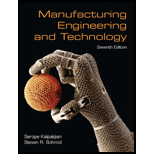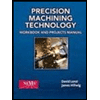
Manufacturing Engineering & Technology
7th Edition
ISBN: 9780133128741
Author: Serope Kalpakjian, Steven Schmid
Publisher: Prentice Hall
expand_more
expand_more
format_list_bulleted
Concept explainers
Textbook Question
Chapter 24, Problem 43QTP
A 12-in.-long, 1-in.-thick plate is being cut on a band saw at 150 ft/min. The saw has 12 teeth per inch. If the feed per tooth is 0.003 inch, how long will it take to saw the plate along its length?
Expert Solution & Answer
Want to see the full answer?
Check out a sample textbook solution
Students have asked these similar questions
-6-
8 من 8
Mechanical vibration
HW-prob-1
lecture 8 By: Lecturer Mohammed O. attea
The 8-lb body is released from rest a distance xo
to the right of the equilibrium position.
Determine the displacement x as a function of time t,
where t = 0 is the time of release.
c=2.5 lb-sec/ft
wwwww
k-3 lb/in.
8 lb
Prob. -2
Find the value of (c) if the system is critically
damping.
Prob-3
Find Meq and Ceq at point B, Drive eq. of
motion for the system below.
Ш
H
-7~
+
目
T T & T
тт
+
Q For the following plan of building foundation, Determine
immediate settlement at points (A) and (B) knowing that: E,-25MPa,
u=0.3, Depth of foundation (D) =1m, Depth of layer below base level
of foundation (H)=10m.
3m
2m
100kPa
A
2m
150kPa
5m
200kPa
B
W
PE
2
43
R² 80 + 10 + kr³ Ø8=0 +0
R²+J+ kr200
R² + J-) + k r² = 0
kr20
kr20
8+
W₁ =
= 0
R²+1)
R²+J+)
4
lec 8.pdf
Mechanical vibration
lecture 6
By: Lecturer Mohammed C. Attea
HW1 (Energy method)
Find equation of motion and natural frequency for the system shown in fig. by energy
method.
m. Jo
000
HW2// For the system Fig below find
1-F.B.D
2Eq.of motion
8 wn
4-0 (1)
-5-
m
Chapter 24 Solutions
Manufacturing Engineering & Technology
Ch. 24 - Explain why milling is such a versatile machining...Ch. 24 - Describe a milling machine. How is it different...Ch. 24 - Describe the different types of cutters used in...Ch. 24 - Define the following: face milling, peripheral...Ch. 24 - Can threads be machined on a mill? Explain.Ch. 24 - What is the difference between feed and feed per...Ch. 24 - Explain the relative characteristics of climb...Ch. 24 - Describe the geometric features of a broach and...Ch. 24 - What is a pull broach? A push broach?Ch. 24 - Why is sawing a commonly used process? Why do some...
Ch. 24 - What advantages do bed-type milling machines have...Ch. 24 - Explain why the axis of a hob is tilted with...Ch. 24 - What is a shell mill? Why is it used?Ch. 24 - Why is it difficult to saw thin sheet metals?Ch. 24 - Of the processes depicted in Fig. 24.2, which is...Ch. 24 - Describe the tool motion during gear shaping.Ch. 24 - When is filing necessary?Ch. 24 - Would you consider the machining processes...Ch. 24 - Why is end milling such an important versatile...Ch. 24 - List and explain factors that contribute to poor...Ch. 24 - Explain why broaching crankshaft bearings is an...Ch. 24 - Several guidelines are presented in this chapter...Ch. 24 - What are the advantages of helical teeth over...Ch. 24 - Explain why hacksaws are not as productive as band...Ch. 24 - What similarities and differences are there in...Ch. 24 - Why do machined gears have to be subjected to...Ch. 24 - How would you reduce the surface roughness shown...Ch. 24 - Why are machines such as the one shown in Fig....Ch. 24 - Comment on your observations concerning the...Ch. 24 - Explain how contour cutting could be started in a...Ch. 24 - Prob. 32QLPCh. 24 - Describe the parts and conditions under which...Ch. 24 - Explain the reason that it is difficult to use...Ch. 24 - Would you recommend broaching a keyway on a gear...Ch. 24 - Prob. 37QTPCh. 24 - A slab-milling operation is being performed at a...Ch. 24 - Show that the distance lc in slab milling is...Ch. 24 - Prob. 40QTPCh. 24 - Calculate the chip depth of cut, tc, and the...Ch. 24 - Estimate the time required to face mill a...Ch. 24 - A 12-in.-long, 1-in.-thick plate is being cut on a...Ch. 24 - A single-thread hob is used to cut 40 teeth on a...Ch. 24 - Assume that m the face-milling operation shown in...Ch. 24 - A slab-milling operation will take place on a part...Ch. 24 - Prob. 47QTPCh. 24 - In describing the broaching operations and the...Ch. 24 - The parts shown in Fig. 24.1 are to be machined...Ch. 24 - Would you prefer to machine the part in Fig. 24....Ch. 24 - Prob. 51SDPCh. 24 - Suggest methods whereby milling cutters of various...Ch. 24 - Prepare a comprehensive table of the process...Ch. 24 - Prob. 55SDPCh. 24 - Make a list of all the processes that can be used...
Knowledge Booster
Learn more about
Need a deep-dive on the concept behind this application? Look no further. Learn more about this topic, mechanical-engineering and related others by exploring similar questions and additional content below.Similar questions
- The hose supplying the cylinder operating the bucket of a large excavator has fluid at 1000 psi flowing at 5 gpm. What is theavailable power in the line?arrow_forwardQ For the following plan of building foundation, Determine immediate settlement at points (A) and (B) knowing that: E,-25MPa, u=0.3, Depth of foundation (D) =1m, Depth of layer below base level of foundation (H)=10m. 3m 2m 100kPa A 2m 150kPa 5m 200kPa Barrow_forwardGiven the following data for crack rocker mechanism. If θ2 = 4π/3 and ω2 = 1 rad/s, Determine all possible values of ω4 and ω3 analytically. The lengths of links are a = 2, b = 8, c = 7 and d = 9 in cm.arrow_forward
- Q6] (20 Marks) Select the most suitable choice for the following statements: modo digi -1A 10 af5 1 -The copper-based alloy which is responded to age hardening is a) copper-nickel b) aluminum bronze c) copper - beryllium d) brass besincaluy 2- Highly elastic polymers may experience elongations to greater than.... b) 500% bromsia-P c) 1000%. d) 1200% 15m or -2 a)100% 3- The cooling rate of quenching the steel in saltwater will be ......the cooling rate of quenching ir c) faster than sold) none of them a) slower than 4- Adding of a) Cr b) the same as ...... Will lead to stabilize the b) Mo 10 austenite in steel. c) Nimble avolls 1d) Sized loloin nl 5- The adjacent linear chains of crosslinked polymers are joined one to another at various positic DIR... by.........bonds c) covalent noisqo gd) ionic lg 120M 6- For the ceramic with coordination number 6 the cation to anion radius ratio will be a) Van der Waals a) 0.155-0.225 a) linear b) hydrogen (b) 0.225-0.414 c) 0.414 0.732 ..polymers.…arrow_forwardExamine Notes: Attempt Six Questions Only. rever necessa , Q1] (20 Marks) Answer with true (T) or false (F), corrects the wrong phrases, and gives sho reasons for correct and corrected statements: 1- High chromium irons are basically grey cast irons alloyed with 12 to 30 % Cr. yous board-19qgo orT-1 2- The drawbacks of Al- Li alloys are their high young modulus and high density.&M 0) (0 3- Vulcanized rubbers are classified under thermoplastic polymers. 4- Diamond is a stable carbon polymorph at room temperature and atmospheric pressure. ( 5- The metallic ions of ceramic are called anions, and they are positively charged. yldgiH-S 69001(6arrow_forwardH.W 5.4 Calculate the load that will make point A move to the left by 6mm, E-228GPa. The diameters of the rods are as shown in fig. below. 2P- PA 50mm B 200mm 2P 0.9m 1.3marrow_forward
- d₁ = = Two solid cylindrical road AB and BC are welded together at B and loaded as shown. Knowing that 30mm (for AB) and d₂ 50mm (for BC), find the average normal stress in each road and the total deformation of road AB and BC. E=220GPa H.W 5.3 60kN A For the previous example calculate the value of force P so that the point A will not move, and what is the total length of road AB at that force? P◄ A 125kN 125kN 0.9m 125kN 125kN 0.9m B B 1.3m 1.3marrow_forwardClass: B Calculate the load that will make point A move to the left by 6mm, E-228GPa The cross sections of the rods are as shown in fig. below. 183 P- Solution 1.418mm 200mm 80mm 3P- 18.3 A 080mm B 200mm 3P- 0.9m إعدادات العرض 1.3m 4.061mmarrow_forwardH.W6 Determine the largest weight W that can be supported by two wires shown in Fig. P109. The stress in either wire is not to exceed 30 ksi. The cross- sectional areas of wires AB and AC are 0.4 in2 and 0.5 in2, respectively. 50° 30° Warrow_forward
- Find equation of motion and natural frequency for the system shown in fig. by energy method. H.W2// For the system Fig below find 1-F.B.D 2-Eq.of motion 8wn 4-0 (5) m. Jo marrow_forward2. Read the following Vernier caliper measurements. (The scales have been enlarged for easier reading.) The Vernier caliper is calibrated in metric units. (a) 0 1 2 3 4 5 سلسلسله (b) 1 2 3 4 5 6 سلسل (c) 1 23456 (d) 1 2 3 4 5 6 سلسلسarrow_forwardExplain why on the interval 0<x<1000 mm and 1000<x<2000mm, Mt is equal to positive 160 Nm, but at x= 0mm and x=1000mm Mt is equal to -160 Nm (negative value!). What is the reason for the sign change of Mt?arrow_forward
arrow_back_ios
SEE MORE QUESTIONS
arrow_forward_ios
Recommended textbooks for you
 Precision Machining Technology (MindTap Course Li...Mechanical EngineeringISBN:9781285444543Author:Peter J. Hoffman, Eric S. Hopewell, Brian JanesPublisher:Cengage Learning
Precision Machining Technology (MindTap Course Li...Mechanical EngineeringISBN:9781285444543Author:Peter J. Hoffman, Eric S. Hopewell, Brian JanesPublisher:Cengage Learning

Precision Machining Technology (MindTap Course Li...
Mechanical Engineering
ISBN:9781285444543
Author:Peter J. Hoffman, Eric S. Hopewell, Brian Janes
Publisher:Cengage Learning
Hand Tools; Author: UCI Media;https://www.youtube.com/watch?v=4o0tqF0jDdo;License: Standard Youtube License